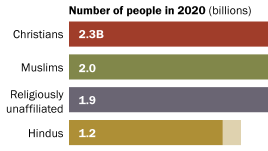
Many Religious ‘Nones’ Around the World Hold Spiritual Beliefs
Despite their nonreligious identity, many unaffiliated adults hold spiritual or religious beliefs. About a fifth or more in 22 countries believe in an afterlife, for example.
Numbers, Facts and Trends Shaping Your World
Despite their nonreligious identity, many unaffiliated adults hold spiritual or religious beliefs. About a fifth or more in 22 countries believe in an afterlife, for example.
All
Publications
Overview Two decades after the Soviet Union’s collapse, Russians, Ukrainians, and Lithuanians are unhappy with the direction of their countries and disillusioned with the state of their politics. Enthusiasm for democracy and capitalism has waned considerably over the past 20 years, and most believe the changes that have taken place since 1991 have had a […]
A new survey finds that there has been virtually no change in Americans’ impressions of the Mormon faith over the past four years. Meanwhile, about half of all voters, and 60% of evangelical Republicans, know that Mitt Romney is a Mormon. Romney’s religion has implications for his nomination run but not for the general election should he be nominated as his party’s standard bearer.
A new report gives a brief history of organized religious advocacy in Washington, D.C., and examines the major characteristics of religion-related advocacy. A related online directory includes profiles of 216 groups currently or recently active in the nation’s capital.
One year out from the presidential election, Romney and Perry had roughly equal support among registered Republican and Republican-leaning evangelicals, and both led Obama in a hypothetical matchup.
How do Americans view the Mormon faith and its followers? What is the public’s attitude toward Mormon presidential candidates? Explore the Pew Research Center’s resources on Mormonism and The Church of Jesus Christ of Latter-day Saints, including a poll on the public’s perceptions of a Mormon candidate, a profile of Mormons based on survey data, […]
Christians remain the largest religious group, and Muslims grew the fastest from 2010 to 2020. Read how the global share of Buddhists, Hindus, Jews and the religiously unaffiliated changed.
Most who use astrology (or a horoscope), tarot cards or a fortune teller say they do so just for fun rather than for insights about life.
After years of decline, the U.S. Christian share now shows signs of leveling off. The new Religious Landscape Study explores trends in identity, beliefs and practices.
The Global Religious Futures (GRF) project is jointly funded by The Pew Charitable Trusts and The John Templeton Foundation. Here are some big-picture findings from the GRF, together with context from other Pew Research Center studies.







